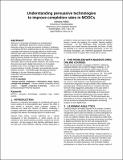Files in this item
Understanding persuasive technologies to improve completion rates in MOOCs
Item metadata
| dc.contributor.author | Wilde, Adriana | |
| dc.date.accessioned | 2017-11-30T13:30:08Z | |
| dc.date.available | 2017-11-30T13:30:08Z | |
| dc.date.issued | 2016-06-07 | |
| dc.identifier.citation | Wilde , A 2016 , ' Understanding persuasive technologies to improve completion rates in MOOCs ' , Paper presented at HCI and the Educational Technology Revolution , Bari , Italy , 7/06/16 - 7/06/16 . | en |
| dc.identifier.citation | workshop | en |
| dc.identifier.other | PURE: 251541016 | |
| dc.identifier.other | PURE UUID: 5a321882-9275-4d3a-a727-017703856cf1 | |
| dc.identifier.other | RIS: urn:0FCEFED47C18B1B709B066ECC66C4A54 | |
| dc.identifier.uri | https://hdl.handle.net/10023/12206 | |
| dc.description.abstract | Advances in computing technologies are revolutionising education. Specifically, advances in Human-Computer Interaction impact the media and methods of delivery, facilitating a conceptual shift from traditional face-to-face instruction towards a paradigm with delivery increasingly tailored to student needs. Massive Open Online Course(MOOC) providers have now the possibility to both predict and facilitate student success by applying learning analytics techniques on the large amount of data they hold about their learners. More than ever before, key information about successful student behaviour and context can be discovered and used in digital interventions on, for example, students at risk. This is a complex issue which is receiving increased attention in Higher Education and specifically amongst MOOCs providers. This position paper discusses the relevant challenges in the use of learning analytics in MOOCs in conjunction with persuasive technologies in order to improve completion rates. | |
| dc.format.extent | 2 | |
| dc.language.iso | eng | |
| dc.rights | © 2016, the Author(s). This work has been made available online in accordance with the publisher’s policies. This is the author created, accepted version manuscript following peer review and may differ slightly from the final published version. | en |
| dc.subject | MOOCs | en |
| dc.subject | Persuasive technologies | en |
| dc.subject | Completion rates | en |
| dc.subject | Student success | en |
| dc.subject | LB Theory and practice of education | en |
| dc.subject | QA75 Electronic computers. Computer science | en |
| dc.subject | T Technology | en |
| dc.subject.lcc | LB | en |
| dc.subject.lcc | QA75 | en |
| dc.subject.lcc | T | en |
| dc.title | Understanding persuasive technologies to improve completion rates in MOOCs | en |
| dc.type | Conference paper | en |
| dc.description.version | https://doi.org/Postprint | en |
| dc.contributor.institution | University of St Andrews. School of Computer Science | en |
| dc.description.status | Peer reviewed | en |
This item appears in the following Collection(s)
Items in the St Andrews Research Repository are protected by copyright, with all rights reserved, unless otherwise indicated.

